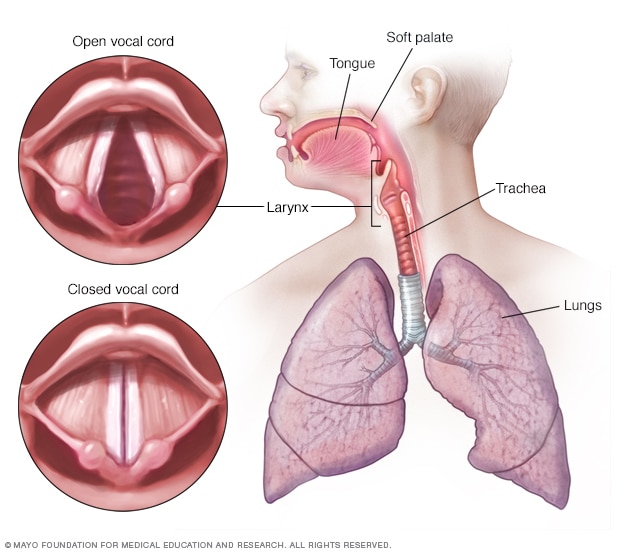Overview
Vocal cord paralysis is a condition that causes the loss of control of the muscles that control the voice. It happens when the nerve impulses to the voice box, also called the larynx, are disrupted. This results in paralysis of the vocal cord muscles.
Vocal cord paralysis can make it hard to speak and even breathe. The vocal cords, also called vocal folds, do more than just produce sound. They also protect the airway. They prevent food, drink and even saliva from entering the windpipe and causing a person to choke.
Possible causes of vocal cord paralysis include nerve damage during surgery, viral infections and certain cancers. Treatment for vocal cord paralysis usually involves surgery, and sometimes voice therapy.
Products & Services
Symptoms
Vocal cords open and closed

Vocal cords open and closed
Vocal cords open when you breathe and then close to produce sound when vibrating together.
Vocal cord paralysis usually involves the loss of control of only one vocal cord. Paralysis of both vocal cords is a rare but serious condition. This can make it hard to speak and can cause trouble with breathing and swallowing.
The vocal cords are two flexible bands of muscle tissue that sit at the entrance to the windpipe, also known as the trachea. When speaking, the bands come together and vibrate to make sound. The rest of the time, the vocal cords are relaxed in an open position so that you can breathe.
Symptoms of vocal cord paralysis may include:
- A breathy quality to the voice.
- Hoarseness.
- Noisy breathing.
- Shortness of breath.
- Loss of vocal pitch.
- Choking or coughing while swallowing food, drink or saliva.
- The need to take several breaths while speaking.
- Inability to speak loudly.
- Loss of a gag reflex.
- Ineffective coughing.
- Frequent throat clearing.
When to see a doctor
Contact your healthcare professional if you have a hoarse voice that can't be explained and that lasts for more than 2 to 4 weeks. Also see your healthcare professional if you notice any voice changes or discomfort.
Causes
Vocal cord paralysis happens when nerve impulses to the voice box, known as the larynx, are disrupted. This causes the muscle to become paralyzed. Often the exact cause of vocal cord paralysis isn't known. But some known causes may include:
- Injury to the vocal cord during surgery. Surgery on or near the neck or upper chest can result in damage to the nerves that serve the voice box. Surgeries that carry a risk of damage include surgeries to the thyroid or parathyroid glands, esophagus, neck, and chest.
- Neck or chest injury. Trauma to the neck or chest may injure the nerves that serve the vocal cords or the voice box itself.
- Stroke. A stroke interrupts blood flow in the brain and may damage the part of the brain that sends messages to the voice box.
- Tumors. Tumors, both cancerous and noncancerous, can grow in or around the muscles, cartilage or nerves controlling the function of the voice box. This can cause vocal cord paralysis.
- Infections. Some infections, such as Lyme disease, Epstein-Barr virus and herpes, can cause inflammation and directly damage the nerves in the voice box. There's some evidence that infection with COVID-19 may cause vocal cord paralysis.
- Neurological conditions. Certain neurological conditions, such as multiple sclerosis or Parkinson's disease, can lead to vocal cord paralysis.
Risk factors
Risk factors for vocal cord paralysis include:
- Having throat or chest surgery. People who need surgery on their thyroid, throat or upper chest have an increased risk of vocal cord nerve damage. Sometimes the breathing tubes used in surgery or to help people breathe when they're having serious respiratory trouble can damage the vocal cord nerves.
- Having a neurological condition. People with certain neurological conditions — such as Parkinson's disease or multiple sclerosis — are more likely to develop vocal cord weakness or paralysis.
Complications
Breathing problems associated with vocal cord paralysis may be so mild that you just have a hoarse-sounding voice. Or they can be so serious that they're life-threatening.
Vocal cord paralysis keeps the opening to the airway from completely opening or closing. This can cause someone to choke on or inhale food or liquid, known as aspiration. Aspiration that leads to severe pneumonia is rare but serious and requires immediate medical care.
The Mayo Clinic experience and patient stories
Our patients tell us that the quality of their interactions, our attention to detail and the efficiency of their visits mean health care like they've never experienced. See the stories of satisfied Mayo Clinic patients.